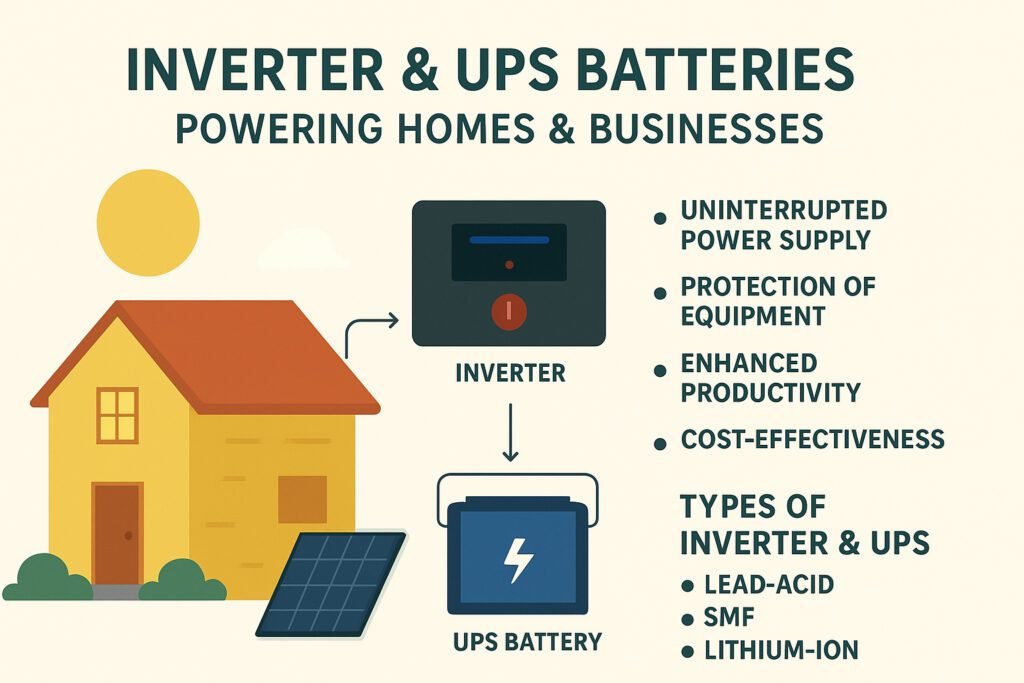In today’s world, where electricity powers almost every aspect of daily life, uninterrupted power supply (UPS) systems and inverters have become essential. Whether at home, in small businesses, or in large enterprises, power cuts and voltage fluctuations can disrupt productivity, damage sensitive equipment, and affect comfort. This is where inverter and UPS batteries play a critical role, ensuring continuous, reliable, and stable power.
Understanding Inverter and UPS Batteries
At the core of any inverter or UPS system lies the battery. While the inverter or UPS unit converts stored energy into usable electricity during outages, it is the battery that stores this energy. The efficiency, capacity, and durability of the battery directly determine how long and how effectively backup power can be delivered.
Inverter and UPS batteries are designed to provide power backup during electricity interruptions, ranging from just a few minutes (for computers and critical systems) to several hours (for homes, shops, and offices). With rising energy demand and recurring power cuts in many regions, these batteries have become indispensable for both households and businesses.
Types of Inverter & UPS Batteries
-
Lead-Acid Batteries
The most widely used type, lead-acid batteries are affordable, easy to maintain, and capable of delivering high surge currents. They are available in two main categories:-
Flat Plate Batteries: Suitable for areas with short and frequent power cuts.
-
Tubular Batteries: Long-lasting, more efficient, and ideal for regions with long-duration outages.
-
-
Sealed Maintenance-Free (SMF) Batteries
Commonly used in UPS systems for offices and IT equipment, SMF batteries are compact, sealed, and require no maintenance. They are safe for indoor use and offer consistent performance, though they typically have a shorter lifespan compared to tubular batteries. -
Lithium-Ion Batteries
Emerging as the future of power storage, lithium-ion batteries are lightweight, highly efficient, and offer longer lifecycles. Although they come with a higher initial cost, their low maintenance and compact size make them increasingly popular in premium inverter and UPS applications.
Importance in Homes
In many households, power interruptions not only cause inconvenience but can also disrupt essential daily activities. From running fans, lights, and refrigerators to powering Wi-Fi routers, inverters with reliable batteries ensure comfort and productivity at home. Inverter batteries:
-
Provide seamless power for essential appliances.
-
Protect household electronics from voltage fluctuations.
-
Enable families to continue remote work, online learning, or entertainment without interruption.
For urban households where work-from-home setups and smart devices are increasingly common, investing in high-quality inverter batteries is no longer a luxury but a necessity.
Importance in Businesses
For businesses—whether small shops, offices, or large enterprises—uninterrupted power is directly linked to efficiency, revenue, and customer trust. UPS and inverter batteries are vital in:
-
Retail Stores & SMEs: Ensuring smooth billing and operations during outages.
-
IT & Corporate Offices: Protecting sensitive systems, servers, and data from sudden shutdowns.
-
Healthcare Facilities: Powering critical equipment and ensuring patient safety during emergencies.
-
Industrial Units: Minimizing downtime and protecting machinery from damage due to voltage fluctuations.
In fact, for businesses where time-sensitive data or customer service is critical, even a few minutes of downtime can result in significant losses. A reliable UPS system with durable batteries ensures continuity and builds trust.
Key Benefits of Inverter & UPS Batteries
-
Uninterrupted Power Supply: Ensures seamless operations and comfort during outages.
-
Protection of Equipment: Prevents damage to electronics caused by sudden power cuts or surges.
-
Enhanced Productivity: Businesses and individuals can work without interruptions.
-
Cost-Effectiveness: Investing in high-quality batteries reduces long-term expenses associated with downtime, equipment damage, or frequent replacements.
-
Eco-Friendly Options: With advancements in lithium-ion technology, energy storage is becoming greener and more efficient.
Challenges & Considerations
While inverter and UPS batteries provide numerous benefits, consumers must also consider:
-
Maintenance: Lead-acid batteries require regular water top-ups and servicing.
-
Battery Life: Average lifespan ranges from 3–6 years depending on type and usage.
-
Cost: Initial investment can be significant, especially for lithium-ion solutions.
-
Space & Safety: Proper ventilation and safe installation are necessary to avoid overheating or hazards.
Choosing the right battery depends on power requirements, budget, frequency of outages, and expected backup duration.
The Future of Backup Power
As energy demands rise and technology advances, the future of inverter and UPS batteries is moving toward smart, efficient, and eco-friendly solutions. Lithium-ion batteries, renewable energy integration, and IoT-enabled monitoring systems are transforming backup power into a more reliable and sustainable ecosystem.
The trend is shifting from basic energy storage to intelligent energy management, where batteries not only provide backup but also optimize energy use, reduce electricity bills, and support renewable sources like solar.

